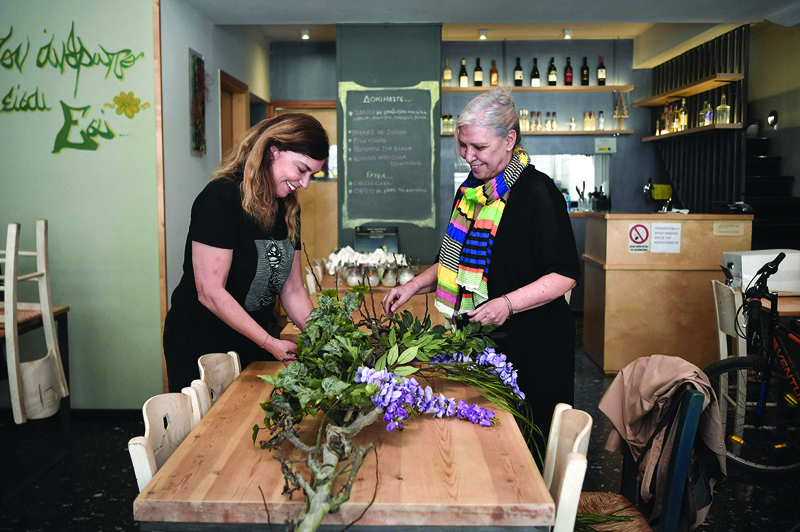 Venetia, owner of a restaurant and her cook Florentia arrange flowers to decorate the restaurant, closed since November 2020, in the trendy Koukaki district of Athens. - AFP
Venetia, owner of a restaurant and her cook Florentia arrange flowers to decorate the restaurant, closed since November 2020, in the trendy Koukaki district of Athens. - AFPIn the trendy Koukaki district, a discus throw from the Acropolis in Athens, owners of restaurants that have survived the virus lockdown are trying to keep themselves occupied as the weather and the noises from government improve. "Everyone is frantically cleaning their storefronts, just to keep busy," says Elena, who sells ouzo, the popular anise-flavored drink, to the restaurateurs.
She is wandering the streets to see how many of the restaurants have managed to avoid going out of business. Some five months after the Greek government ordered a restaurant shutdown in November as coronavirus cases began to increase, operators and their staff have been burning up both their financial and psychological reserves.
"We have borrowed money and spend less. We have learned to live on little since the economic crisis," says Koukaki restaurant owner Venetia Avgerinou, referring to the ten-year debt crisis Greece has just exited. His restaurant was only allowed to open for four months last year. Since November, all ten staff members have been put on a government partial employment scheme. The cook, Florentia Psimadis, has had to survive on a monthly allowance of 534 euros ($628), while her husband was already unemployed.
Faced with growing lockdown fatigue but buoyed by improving weather and increasing COVID-19 vaccinations, the government now says the sector can reopen next month, but only for service outdoors. "I predict that this will not happen before (Orthodox) Easter," which falls on May 2, Prime Minister Kyriakos Mitsotakis told Star TV on Wednesday.
Establishments threatened
Greece at present has over 3,000 new coronavirus infections and over 70 deaths daily, higher figures than when the lockdown was ordered in November. The government has already announced a tentative reopening of the vital tourism sector for May 14. Special allowances are already being made for vaccinated Israeli tourists, while other foreign visitors must self-quarantine for a week upon arrival. But Grigoris Tassios, head of the Hellenic hoteliers federation, says there is no significant movement in room bookings.
"Right now there is no tourism traffic, except some pilot schemes that are still covered by restrictions... after all, in epidemiological terms, Greece is in the red," he tells AFP. "We expect tourism to realistically begin at the end of June." At least 330,000 people work in Greece's restaurant industry. According to the president of the restaurant owners' union, Yiorgos Kavvathas, six out of ten establishments are threatened with closure, despite the measures to save them. Dozens of restaurants, bars and cafes have already gone out of business in central Athens and the northern city of Thessaloniki, he notes.
'Will we collapse under debt?'
To keep himself afloat, bistro owner Tilemachos Nikoletatos decided to downsize. He ended his rental lease in the working-class Athens district of Kesariani and will open a smaller fast-food restaurant a few meters away. "The bills are piling up, I can no longer pay my rent and I surely cannot keep my 16 employees, so I decided to take smaller, cheaper premises," he tells AFP. Others, like Triantafyllos Ladas who owns a small fish tavern tucked inside an Athens gallery, have relied on a meagre income from takeout customers. Ladas says he serves about ten takeout meals a day and has lost about 80 percent of his turnover.
The government has tapped into an EU support budget of 330 million euros in European funds to help restaurant owners restock their supplies with loans. But many are concerned about making enough money to repay the state. "Will we have the possibility or will we collapse under debt?" asks Avgerinou. "We hope that tourists will be able to come back this summer, that the Greeks will want to go out and meet in restaurants despite the health situation, but there is a lot of uncertainty," says Ladas.
As she waits to reopen, Avgerinou has revamped her Koukaki restaurant menu and has not lost hope. "As Aristotle said, Man is a social animal. We need to meet again, to discuss with friends over a good meal," she says. Ladas also tries to stay philosophical. "In Greece, we go from one crisis to another, but we always recover. I survived the financial crisis, I will survive this one too." - AFP









